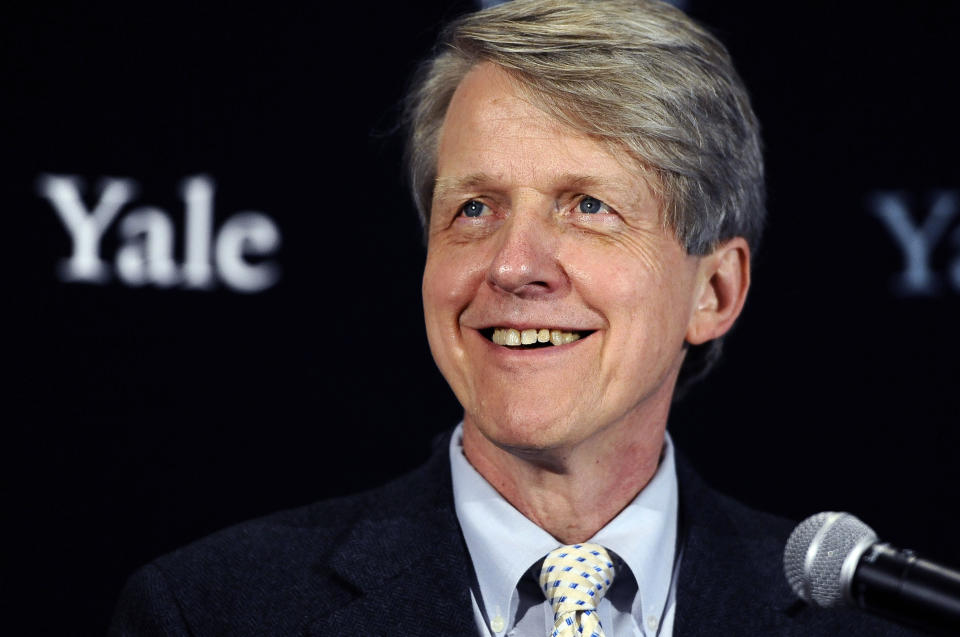Robert Shiller: Trump has a 'psychological' impact on Fed, economy
Viral stories drive the economy, and President Donald Trump knows it.
His tweeting during market downturns — or when he wants to pressure the Federal Reserve into more aggressive monetary policy — has driven Wall Street firms to track his tweet impact. Recently, JP Morgan (JPM) created the “Volfefe Index,” named after Trump’s mysterious May 2017 “covfefe” tweet.
Yale economist Robert Shiller’s new book, called “Narrative Economics: How Stories Go Viral and Drive Major Economic Events,” explores how widely spread stories can influence public confidence.
The Nobel Prize winner told Yahoo Finance that the viral effect partly explains the president’s impact on policy and the economy.
“Trump is critical of the Fed... That must have some sort of psychological effect on these people,” Shiller said on YFi PM.
Even as they insist on independence, Fed officials “don’t want to be seen as having missed it.”
Shiller’s book covers using economic indicators like the closing price of the stock market, or monthly confidence indices, to drive the narrative. These are also tools that the president likes to use to make his point.

Less than a century ago, Calvin Coolidge — the nation’s 30th president — did something similar to Trump. He issued speeches and reassurances to the public whenever the stock market goes down.
Coolidge “was like Trump in that he was really businessman type and pro-business… I think [he] did inspire the Roaring Twenties,” said Shiller. “You have to be as flamboyant as Trump to be an inspiration.”
Shiller’s book noted that in the 1920s, Coolidge and his Treasury Secretary, Andrew Mellon, reassured the public every time the “stock market declined significantly or the public decried speculators’ high level of borrowing to purchase stocks.”
The dynamic became known as the “Coolidge-Mellon bull tips.” That president’s influence on public confidence is not unlike the “Trump Put” — a term popularized by Wall Street in reference to Trump’s comments that could backstop a market selloff.
Shiller also noted in a New York Times op-ed that Trump’s “exuberant speeches, if one believes them, still encourage big spending and confidence.”

Shiller added that “Trump models ostentatious living - he’s a genius at catching the mood of many people. The people think they need a fancy house, now we’re back, we’re not so worried about debt any more.”
But there is a cautionary tale in trying to constantly influence public opinion.
“Unfortunately Calvin Coolidge is not the example we want for good government because it all came crashing down in 1929,” said Shiller. “Was that his fault? I kind of think it was his fault.”
Shiller — who rose to fame as one of the first observers to predict the housing crash — sees similarities in the market today to the stock market crash of 1929. That turmoil led up to the Great Depression of the 1930s — but the economist said there’s no need to panic yet.
“I think the stock market is highly priced as it was like 1929, not quite as high,” he said. “That’s a sign we’re vulnerable to correction downward, but I’m not seeing it as imminent.”
Grete Suarez is producer at Yahoo Finance for YFi PM and The Ticker. Follow her on Twitter: @GreteSuarez
Read more:
Texas AG: Consumers ultimately pay a price for ‘free’ Google searches
Study: Big food brands may be falling short on lofty climate goals
Wedbush's Ives: Apple has an ‘unprecedented opportunity’ amid the trade war
Why one auto watcher thinks Volkswagen buying a Tesla stake is a good idea
Follow Yahoo Finance on Twitter, Facebook, Instagram, Flipboard, SmartNews, LinkedIn, YouTube, and reddit.

 Yahoo Lifestyle
Yahoo Lifestyle 